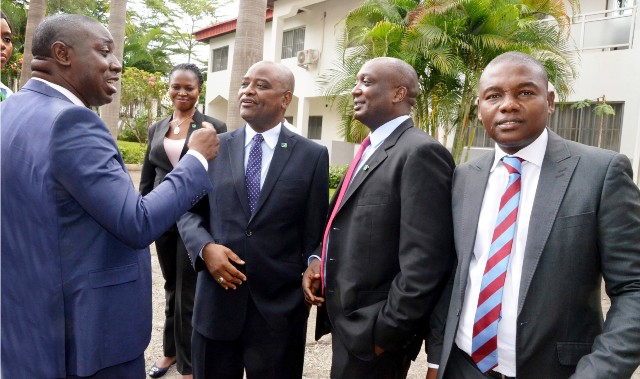Business
Iran Unrest Triggers Oil Price Increase

Oil price rose further above 68 Dollars a barrel yesterday to the highest since May 2015, supported by unrest in Iran that raised concerns about supply risks, cold weather in the U.S., boosting demand and OPEC-led output cuts.
Six days of anti-government protests in OPEC’s third-largest producer added a geopolitical risk premium to oil prices, although Iran’s production and exports had not been affected.
Brent crude, the international benchmark, was unchanged at as high as 68.27dollars. U.S. crude rose 20 cents to 61.83 dollars and also touched the highest since May 2015.
“The protests in Iran add more fuel to the already bullish oil market mood,” said Norbert Rucker, head of commodity research at Swiss bank Julius Baer.
“We believe that today’s oil prices project an overly rosy picture, stick to our cautious view and see the market at risk of profit-taking,” Rucker added.
Freezing weather in the U.S. spurred short-term demand, especially for heating oil.
Aside from the spike in May 2015, oil is trading at its highest since December 2014 – the month in which the Organisation of the Petroleum Exporting Countries decided to stop cutting output, a move that deepened price collapse.
Analysts at JBC Energy said the price reaction to the Iranian unrest was overdone.
OPEC, supported by Russia and other non-members, begun to hammer out a deal to cut supplies again in 2016, aiming to lift prices by removing a glut built up in the previous two years.
Their cuts started a year ago and compliance has been high, aided by involuntary output declines in Venezuela, whose economy is collapsing, plus unrest in Nigeria and Libya. Producers have decided to extend the deal until the end of 2018.
OPEC’s cuts are helping reduce global inventories. In the United States, crude stocks fell by five million barrels in the latest week, the American Petroleum Institute said on Wednesday before the government’s supply report later yesterday.
Byron Wien of Blackstone listed the prospect of U.S. crude topping $80 as one of 10 potential shockers for investors in 2018 in his annual list of surprises.
Balancing the trend towards a tighter market is higher production in the United States, where the OPEC-led effort to push prices up is spurring more shale oil output.
Business
Agency Gives Insight Into Its Inspection, Monitoring Operations

Business
BVN Enrolments Rise 6% To 67.8m In 2025 — NIBSS

The Nigeria Inter-Bank Settlement System (NIBSS) has said that Bank Verification Number (BVN) enrolments rose by 6.8 per cent year-on-year to 67.8 million as at December 2025, up from 63.5 million recorded in the corresponding period of 2024.
In a statement published on its website, NIBSS attributed the growth to stronger policy enforcement by the Central Bank of Nigeria (CBN) and the expansion of diaspora enrolment initiatives.
NIBSS noted that the expansion reinforces the BVN system’s central role in Nigeria’s financial inclusion drive and digital identity framework.
Another major driver, the statement said, was the rollout of the Non-Resident Bank Verification Number (NRBVN) initiative, which allows Nigerians in the diaspora to obtain a BVN remotely without physical presence in the country.
A five-year analysis by NIBSS showed consistent growth in BVN enrolments, rising from 51.9 million in 2021 to 56.0 million in 2022, 60.1 million in 2023, 63.5 million in 2024 and 67.8 million by December 2025. The steady increase reflects stronger compliance with biometric identity requirements and improved coverage of the national banking identity system.
However, NIBSS noted that BVN enrolments still lag the total number of active bank accounts, which exceeded 320 million as of March 2025.
The gap, it explained, is largely due to multiple bank accounts linked to single BVNs, as well as customers yet to complete enrolment, despite the progress recorded.
Business
AFAN Unveils Plans To Boost Food Production In 2026
-

 Politics5 days ago
Politics5 days agoEFCC Alleges Blackmail Plot By Opposition Politicians
-
Business5 days ago
AFAN Unveils Plans To Boost Food Production In 2026
-

 Sports5 days ago
Sports5 days agoJ And T Dynasty Set To Move Players To Europe
-
Politics5 days ago
Datti Baba-Ahmed Reaffirms Loyalty To LP, Forecloses Joining ADC
-
Business5 days ago
Industrialism, Agriculture To End Food Imports, ex-AfDB Adviser Tells FG
-
Politics5 days ago
Bayelsa APC Endorses Tinubu For Second Term
-
Business5 days ago
Cashew Industry Can Generate $10bn Annually- Association
-

 Entertainment5 days ago
Entertainment5 days agoAdekunle Gold, Simi Welcome Twin Babies

